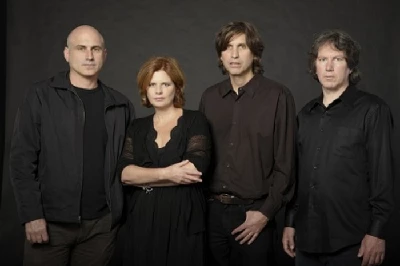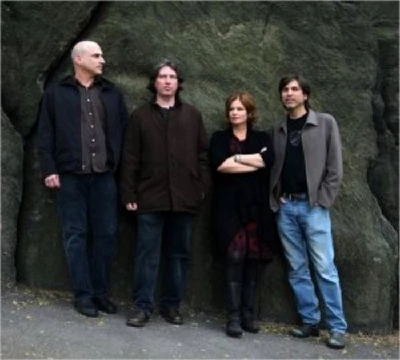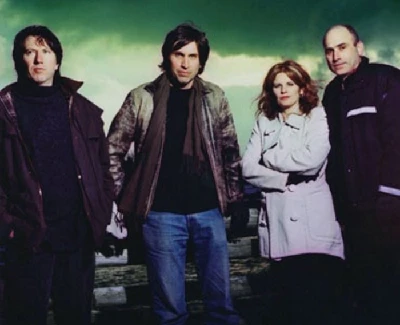published: 18 /
5 /
2011

The guitarist and main songwriter with the Cowboy Junkies, Michael Timmins speaks to Richard Lewis about his group's long history, and and their latest record, ‘Demons’, which is a set of covers of songs by their friend Vic Chesnutt who died in 2009
Article
Founded in 1985, alt-country pioneers the Cowboy Junkies have steered their own idiosyncratic course over the past four decades. Best known for the understated groundbreaking beauty of their 1988 second album ‘The Trinity Session’, the Canadian band have influenced legions of folk and alt-country acts. Now totally independent, courtesy of their own label, Latent Recordings, the group have pressed ahead with the ‘Nomad Series’, a set of four albums which will be released over eighteen months. Critically acclaimed Volume 1, ‘Remin Park’, was influenced largely by Chinese musicians, whilst Volume 2 and their most recent album ‘Demons’ features the work of much-revered late US singer-songwriter Vic Chesnutt, who tragically committed suicide in 2009.
Pennyblackmusic talked with Junkies’ guitarist and chief songwriter Michael Timmins about the inspiration behind the project, the band’s future plans and the enduring legacy of their work.
PB: What inspired you to cover Vic Chesnutt’s songs?
MT: We’ve always been huge fans of his and have always been amazed at the quality of his work. When we were recording ‘Trinity Revisited’ (20th anniversary edition and re-recording of ‘The Trinity Session’ by the Junkies, upon which Vic Chesnutt replaced vocalist Margo Timmins on one of the tracks, ‘Postcard Blues’-Ed) , we talked with Vic about doing an album with him. He would write the songs, and we would produce it and be his band. We talked on and off about it for a couple of years and were never able to synch up our schedules, and then we just, literally, ran out of time. So the cover album seemed to be a logical extension of that plan.
PB: Why do you think his music appeals to other musicians/songwriters so much? I am thinking of the 1996 ‘Sweet Relief’ covers LP of Vic Chesnutt songs, which had some really amazing acts on there.
MT: I think that any band or artist, who has had any sort of commercial success, realizes that there is so much luck involved. There is a lot of hard work and, in most cases, one needs a lot of talent, but there also has to be some good luck.
When those of us who have had a bit of good fortune stumble across someone as talented as Vic and someone who has produced the quality of work that Vic produced, but who hasn’t had the breaks, it makes us want to get behind that person and try and lift them up. We know how difficult it is to write and record a catalogue of music as rich and varied as Vic’s, and we know that it deserves a larger audience.
PB: How did you select the tracks you wanted to include on ‘Demons’, especially considering how extensive Vic’s back catalogue is?
MT: The four of us chose whatever songs we wanted to work on, and then we put our lists together and narrowed it down to 19 songs (11 of those are on the album and 8 are on a bonus EP that is available for download on our website).
We had several loose criteria for the final choices. We wanted to choose songs that covered the length of his whole catalogue; we wanted to try and reflect his various “types” of songs; we chose songs that we thought we could do justice to and which we thought we could bring another angle to, and we chose songs that we loved and felt couldn’t be left off.
PB: Was it a difficult decision to include ‘Flirted With You All My Life’ as a track, considering how dark the subject matter is?
MT: It was pretty difficult dealing with a lot of this material. We gave ‘Flirted’ a more upbeat triumphant vibe, almost a celebratory feel so it wasn’t the most difficult. The hardest one was ‘See You Around’ which was probably written as a “break up” song, but in this context took on a whole new meaning.
PB: What has inspired you to release the four albums of the ‘Nomad Series’ in such a short space of time?
MT: We couldn’t decide on what direction to go for our next album project, and we had so many ideas which didn’t seem to mesh with the idea of just doing one album. So we came up with this idea of doing a series of albums, and we put a time frame on it because we needed that focus for such an ambitious project (otherwise it would drift) and we felt that the limited time would give the four albums a certain cohesion.
PB: How important is it to the group to include songs by other artists on your albums and in view of your Dylan, Reed, Springsteen and Hank Williams covers?
MT: It depends on the album. We haven’t included covers on most of our albums in the last 15 years or so, but we have recorded a lot of cover songs for various one-off projects. We did an album of mostly covers in 2003, ‘Early 21st Century Blues’, which was an album about war ,and violence and we included a couple of cover songs from two Chinese artists on ‘Renmin Park’, because that album revolved around China and Chinese influences. Cover songs have always been important to us, but we only include them on an album if they make sense in context with the album as a whole.
PB: Did you expect ‘The Trinity Session’ to become a landmark album when you were recording it?
MT: No. We knew we had recorded something very special from a personal perspective, but we certainly never dreamed that it would have the international impact that it had. We were an independent band recording for our own label. There were no expectations.
PB: You seem quite fond of the UK, especially in view of your of your kind words on the 2002 album, ‘BBC Radio One Sessions’. Do you have any plans to visit again soon?
MT: Whenever we are over there, we always have a great time and we always tell ourselves that we need to get back more often. The problem is finances; it’s a very expensive journey. We have tentative plans to be in Europe in November, and there is a possibility that we will include a couple of UK dates.
PB: You mention on your website that “the band now has twenty five years under the hood and is sounding so darn good…” Did you expect the group to endure as long as it has?
MT: Not really. Twenty five years is a long time to endure in this type of unit. But we still really enjoy playing together and creating together, so we hope that circumstances will allow us to continue for as long as it is fun and productive.
PB: Can you hear your influence on any of the current generation of acts? I can hear an echo of your sound in Sufjan Stevens’ work.
MT: It’s hard for me to make that leap. Other people tell me about this act or that act that they feel are influenced by us, but I rarely hear someone and make the connection. I am a big Sufjan Stevens fan so I would be flattered if we had influenced him in any way.
PB: Thank you.
Band Links:-
https://www.facebook.com/cowboyjunkies
http://www.cowboyjunkies.com/
https://twitter.com/cjmusic
https://plus.google.com/+Latentrecordi
Have a Listen:-
Picture Gallery:-



